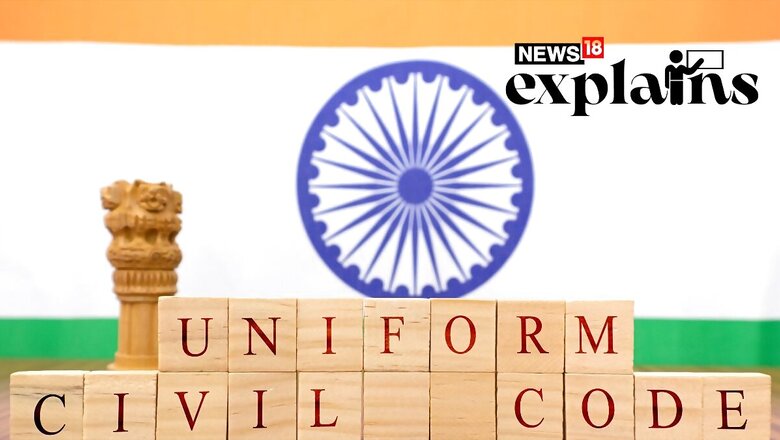'UCC Draft for U'khand Ready for Govt Submission': What is Uniform Civil Code, Why It's in Limelight

views
Draft of the proposed Uniform Civil Code for Uttarakhand is complete and would soon be submitted to the state government, Justice (retd) Ranjana Prakash Desai said on Friday. Desai, who heads the committee of experts set up by the Uttarakhand government last year, said the panel has drafted the code taking into account all shades of opinions and looking into various statutes and uncodified laws, including the statutory framework in select countries.
“It gives me immense pleasure to inform you that the drafting of the proposed uniform civil code for Uttarkhand is now complete,” Desai told a press conference here. “The report of the committee along with the draft code would soon be printed and submitted to the government of Uttarakhand,” she added.
Prime Minister Narendra Modi had on Tuesday also made a strong push for a UCC, asking how can the country function with dual laws that govern personal matters. The Law Commission had on June 14 invited views from all stakeholders, including people and recognised religious organisations, on the politically sensitive issue.
Amid the developments, let’s take a look at what the UCC is, and how it could impact society:
What is the Uniform Civil Code?
The UCC refers to a single set of laws that would be applicable to all religious communities in India regarding matters such as marriage, divorce, inheritance, adoption, maintenance, and others. Currently, India has a uniform criminal code that applies to all its citizens, but it does not have a uniform civil law.
The provision for a Uniform Civil Code is mentioned in Article 44 of the Indian Constitution, which is part of the directive principles of state policy. Article 44 states that the state shall strive to establish a Uniform Civil Code for all citizens throughout the territory of India.
The need for a Uniform Civil Code was highlighted in the well-known Shah Bano case in 1985. The Supreme Court of India stated that Article 44 remained a “dead letter,” emphasizing the importance of implementing a uniform civil code in the country.
Why is it in Limelight Again?
Prime Minister Narendra Modi has expressed the need for a Uniform Civil Code (UCC). He recently stated that the country cannot function with a dual system of separate laws for separate communities. However, in response to Modi’s statement, opposition parties, including the Congress, DMK, and AIMIM, accused him of engaging in divisive politics, and that the BJP’s push for the UCC was a poll tactic before the 2024 Lok Sabha elections.
Learn here what parties are in support and against the UCC.
How Will UCC Affect Personal Laws?
The implementation of a Uniform Civil Code (UCC) would have an impact on various religious communities in India. Here are some ways it would affect them:
Hindu community: Existing laws like the Hindu Marriage Act (1955) and the Hindu Succession Act (1956) would be dissolved and incorporated into the UCC. This would lead to standardization and uniformity in marriage, divorce, inheritance, and succession laws for Hindus.
Muslim community: The UCC would replace certain aspects of personal laws that are currently applicable to Muslims. Practices such as contract marriage (mutah), Nikah halala, misyar marriage, and polygamy would likely become ineffective if the UCC is implemented.
Sikh community: The Anand Marriage Act of 1909 governs the marriage laws of Sikhs. However, there is no provision for divorce. If the UCC is introduced, a common law for divorce is likely to be applied to all communities, including Sikhs.
Parsi community: The UCC would impact the laws of adoption within the Parsi community. Currently, Parsis do not recognize the rights of adoptive daughters, and adopted sons have limited inheritance rights. The UCC may introduce reforms to address these disparities.
Guardianship and custody: The UCC would bring about a common set of laws regarding guardianship and custody for all religious communities. This would ensure uniformity and equality in these matters across the board.
It’s important to note that the UCC aims to provide a unified legal framework for all citizens, regardless of their religious affiliation, and promote equality and consistency in matters of personal law. However, the specifics of its implementation and potential implications for different religious communities remain subject to debate and discussions.
With inputs from agencies


















Comments
0 comment